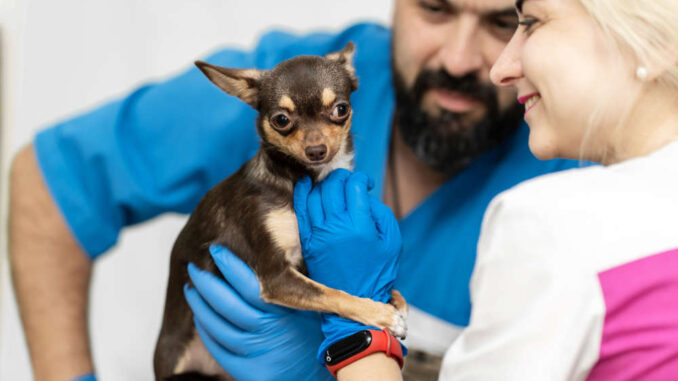
This article was updated on November 14th, 2023
In most cases, you will only become aware that your dog’s anal glands are full when they become problematic, and your dog is starting to show signs of discomfort. This article will show you the 4 best ways to tell when your dog’s anal glands are full and require attention.
Best ways to tell if your dog’s anal glands are getting full
1. Scooting
If you notice your dog dragging or scooting their rear end along the ground repeatedly, it might indicate that their anal glands are full and need emptying. Consistent scooting over several days is sufficient reason to have your dog’s anal glands checked by a veterinarian.
Also consider deworming all the animals in your household if you notice scooting. Intestinal worms are one of the main reasons for scooting.
2. Frequent licking of the bottom
Dogs will occasionally lick around their anus as part of their normal grooming routine. But if you notice an increase in licking of that area, this indicates a potential problem with the anal glands and requires investigation.
3. Foul odor
A strong, unpleasant odor around your dog’s rear end might be an indication that the anal glands are impacted and need attention. Sometimes your dog’s anal glands will empty spontaneously, and this can cause a foul odor, but is often normal. But if it happens often, it is better to have them checked to prevent complications.
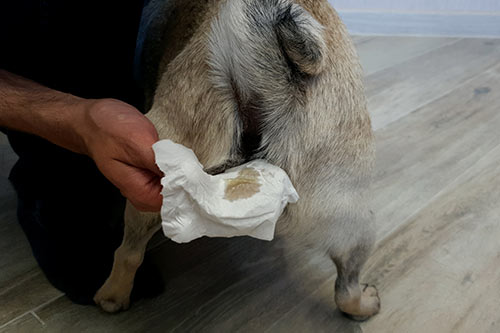
4. Swelling around the Anal Area
Swelling, redness, or tenderness near the anus can be signs of anal gland issues. The anal glands can become infected and can even form abscesses that can burst if not treated. This can be painful for your dog and it is important to have any swelling in the anal glands investigated by a vet.
Dogs can also develop tumors of the anal glands and the tissues around the anus. These can be quite aggressive and earlier treatment and intervention will lead to better outcomes.
If any of the abovementioned symptoms occur for the first time, it is better to have a vet check your pet and rule out any underlying conditions. They will also be able to treat infections or other potential complications. Your vet will then guide you as to how to treat your pet in the future and how to manage your pet’s anal glands at home if it is appropriate.
If your dog has a history of getting overfull or blocked anal glands without any underlying conditions, then the abovementioned symptoms are warning signs that indicate that it is time to express their anal glands.
When to involve a vet, groomer, or express the glands at home yourself
Signs that your need your veterinarian’s help
If your dog is showing distress around the anal area for the first time, then a vet visit is highly recommended. If you notice any marked swelling, bleeding, pain or discharge from the anal glands then your dog may have an infection that needs to be treated promptly.
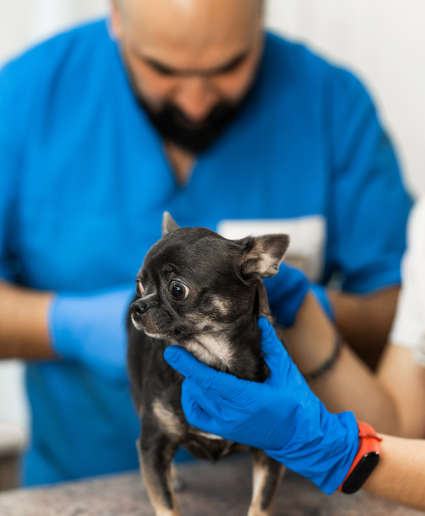
If your dog is unwell, or not eating or showing any other symptoms as well as discomfort in the anal area, there may be something else wrong that could be serious. Don’t delay seeing a vet.
Your vet will be able to do a full investigation and look for other conditions that predisposes your dog to anal gland problems. If you’re unsure about expressing the anal glands or if your dog is showing any of the signs of severe discomfort mentioned above, it’s best to consult a veterinarian. They can properly assess the situation, provide treatment if necessary, and demonstrate the correct technique for at-home expression if applicable.
Groomer
Most professional groomers are comfortable expressing anal glands and will do this as part of the grooming. If your dog does need regular anal gland expression, visiting a groomer for this very helpful. Be sure to check that they are experienced in expressing anal glands.
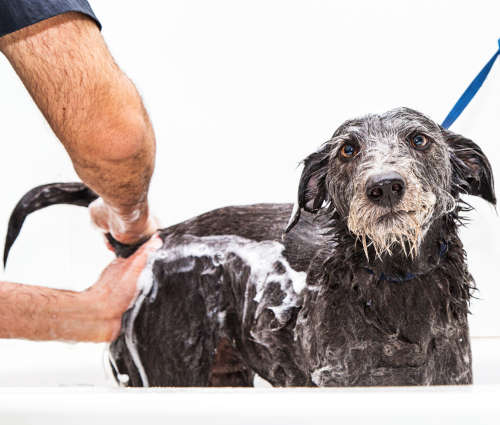
Expressing at Home
Expressing your dog’s anal glands at home is possible if you feel comfortable doing it. This is generally only recommended as a routine and not if your dog has an infection or other complication at the time. Ask your vet to demonstrate the different ways of expressing the glands or read this article to find out how often to express anal glands.
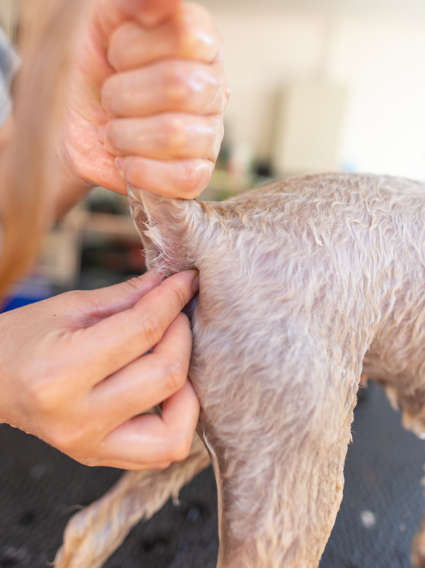
Wearing gloves is recommended and be sure to have some dry shampoo or cotton wool with pet-safe shampoo handy to clean the area. Be very gentle when expressing the glands and make sure you have someone to help keep your dog still so that you don’t accidentally hurt them if they move. It is also important to make sure that your dog can’t bite you whilst you are expressing the anal glands.
If you notice any pain or difficultly in expressing the glands or if there is any bleeding or infected or abnormal discharge, be sure to book a vet visit to have your dog checked out.
How to prevent anal glands from getting full frequently
Preventing frequent anal gland issues is possible with some simple steps:
Dietary Fiber
Ensure your dog’s diet includes enough fiber, as this can promote regular bowel movements and help naturally empty the anal glands. Chat to your vet about appropriate options, some dogs do better on a prescription diet for intestinal problems that is higher in fibre, and other dogs will benefit form a fibre supplement (e.g. bran or psyllium). An increase in fibre may worsen underlying constipation, so be sure to get your vet’s ok before changing the dietary fibre. Read our article: Is pumpkin a miracle food to help with a dog’s anal gland issues?
Regular Exercise
Regular physical activity aids digestion and can contribute to better bowel movements.
Weight Management
Overweight dogs tend to struggle to empty their bowels properly which in turn affects the anal gland emptying. Ask your vet for a body condition score and advice on which diet to choose to help your pet loose weight, if needed.
Regular Vet Check-ups
Regular visits to the veterinarian can help identify and address any potential anal gland issues early on. Dogs with arthritis in their hips and lumbar spines are more likely to struggle with their anal glands. Allergies, especially food allergies, can also lead to constant anal gland issues. If the allergies are not addresses, treating the anal gland problems can be frustrating.
How often should i check my dog’s anal glands?
Most dogs will not struggle with their anal glands, but it is good practice to check your dog’s anal glands regularly during grooming sessions or when you bathe them. If your dog has a history of anal gland problems, it’s recommended to check them every 4 to 6 weeks or as advised by your veterinarian.
Common Problems Associated with Anal Glands
Impaction
The most common issue occurs when the anal glands do not empty properly, leading to discomfort and potential infection.
Abscesses
Untreated impaction can result in the formation of painful abscesses, requiring medical attention.
Infections
Bacteria can enter the anal glands and cause infections, leading to redness, swelling, and pain.
Tumors
In rare cases, tumors can develop in the anal gland area, which may require surgical intervention. These tumors can be very aggressive and spread to other areas of the body.
Frequently Asked Questions
Are there any home remedies to relieve full anal glands?
Increasing fibre intake and keeping your pet at the correct weight can help manage anal gland problems. But in most cases help from a veterinarian will be required.
Can anal gland problems be a sign of a more serious health issue?
Yes, anal gland problems can be a symptom of other health issues including intestinal issues, arthritis in the hind limbs or allergies.
Other conditions, such as perianal fistulas, can start out looking like an anal gland problem but need other intervention. Tumors of the anal glands and surrounding tissues can also be very serious. It is for these reasons that anal gland problems should never be ignored.
What if my dog shows no symptoms but I suspect full anal glands?
If you suspect anal gland issues without any visible symptoms, it’s still best to have your vet examine your dog to rule out any potential problems. Follow your instincts if you feel something is wrong, have it checked out.
Is it normal for my dog’s anal glands to empty during bowel movements?
Yes, it is normal for the anal glands to empty during bowel movements, as this is part of your dog’s natural elimination process. Sometimes they may empty when your pet is relaxed, leaving a foul smelling wet patch on the blanket or bed that they are lying on. This can be very inconvenient because the item will need to be washed and it is worth having them checked if it happens frequently. But in most cases, it is normal.
Is there a permanent solution for my dog’s anal gland problems?
Yes, for dogs that struggle constantly, surgical removal of the anal glands should be considered. Removing the anal glands completely will remove the source of the problem and can be a good long term solution. The procedure can be quite tricky and it is important to choose an experienced veterinary surgeon to prevent complications which could include losing control of the bowels (fecal incontinence). But for many dogs and their owners, surgical removal of the anal glands brings major relief.
Any changes to your pet’s behavior or body, should be noted and investigated. Sometimes only small changes can be a symptom of an underlying condition and swift treatment is always better, and often turns out cheaper than waiting and allowing time for complications to develop.
What are dog’s anal glands?
Anal glands, also known as anal sacs, are small, pea-sized glands located on either side of your dog’s anus. If you imagine your dog’s anus to be a clock face, the anal glands will be located at 4 o’clock and 8 o’clock position.
These glands play a crucial role in your dog’s communication and marking behavior. They produce a highly scented fluid that the relays information regarding the dog’s identity and sexual status. The anal gland fluid is foul smelling and is often described as having a fishy smell.
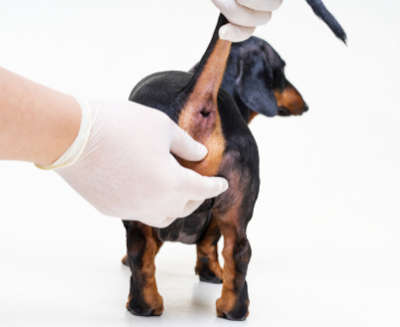
Dogs use these scent markers to glean information about one another and is one of the reasons that they will smell each other’s anal area when meeting one another.
Disclaimer: This website's content is not a substitute for veterinary care. Always consult with your veterinarian for healthcare decisions. Read More.

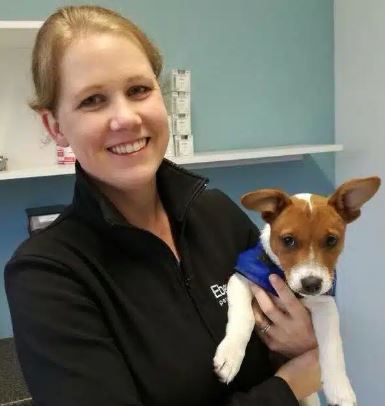
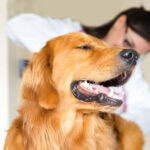
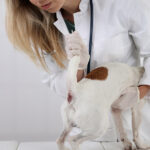
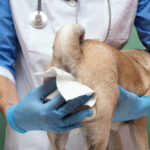
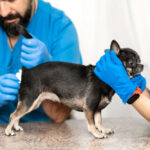
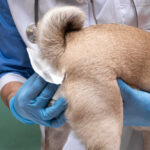

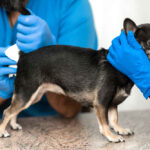


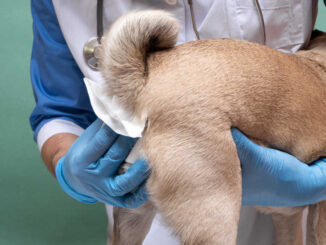
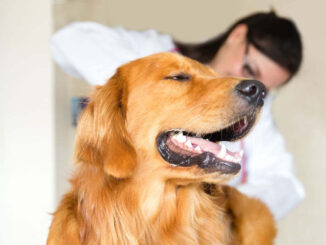
Be the first to comment